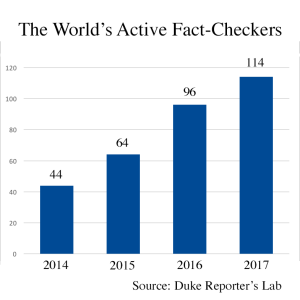Falsehoods and “fake news” are keeping journalists and researchers busy in 47 countries, where 114 dedicated fact-checking teams are now calling out public figures for inaccuracies.
The number of active fact-checking projects increased more than two and half times since the Duke Reporters’ Lab began its annual census three years ago. The current count is up 19 percent from 2016, when the number of active fact-checkers was 96.
was 96.
Nineteen of the fact-checkers started in 2016. That includes 10 in the United States, seven of which focused on state and local politics. The number of startups increases to 23 if we include four additional U.S. fact-checkers that launched in 2016 to cover the U.S. elections but have since shut down. Those four are now among the 55 inactive fact-checking projects that are also tracked by the Reporters’ Lab.
Also among those inactive projects is the ABC News Fact Check in Australia, which closed down in June after government budget cuts. But the ABC Fact Check is expected to return as soon as next month as part of a new partnership between the public broadcaster and RMIT University’s School of Media and Communication — a phoenix-like cycle that we’ve seen before among the world’s fact-checkers.
The Lab regularly updates the database of fact-checkers, which peaked last year at 121 before the end of the raucous U.S. election season (see the current MAP AND LIST). By the time American voters went to the polls, the number of U.S. fact-checkers had temporarily surged to 53 — up from 41 during the presidential primary campaign a year ago — with most focused on politics at the state and local level.
But with the shuttering of eight of PolitiFact’s state affiliates since the election and other updates to our list, the U.S. year-over-year count grew by just two to 43 — or about 38 percent percent of the global total. [UPDATE, March 25: PolitiFact Georgia resumed operations after brief hiatus in March 2017. PolitiFact’s reporting about Georgia politics is now syndicated to state news outlets, including The Atlanta Journal Constitution. The newspaper previously produced its own fact checks, using PolitiFact’s platform and methodology from 2010 to 2016. The numbers of fact-checkers referred to throughout this article are still based on our February count.]
The post-election dip in the U.S. was not surprising. Media fact-checkers that come to life in campaign years often go offline or close down completely after the votes are tallied — a trend PolitiFact founder Bill Adair lamented in an Election Day commentary for the New York Times.
“[P]oliticians don’t stop lying on Election Day,” wrote Adair, who now teaches journalism at Duke and oversees the university’s Reporters’ Lab.
Meanwhile, the fact-checking movement has continued to grow internationally.
Including the United States, 11 countries have more than one fact checker:
United States: 43
France: 6
United Kingdom: 6
Spain: 4
Ukraine: 4
South Korea: 3
Canada: 3
Brazil: 3
Mexico: 2
Argentina: 2
Colombia: 2
Growth was especially strong in Europe, where our count increased 44 percent — from 27 in 2016 to 39 now. While some of that increase came from adding established fact-checkers we previously hadn’t identified, seven of the European fact-checkers were among the 2016 startups.
Among the operations that opened for business in 2016 were fact-checkers in Ireland, Kosovo, Lithuania, Spain and the United Kingdom, plus two in Ukraine (some of these launched early enough to in the year to be counted in last February’s report). New fact-checkers in Columbia and Kenya also launched in 2016. And with upcoming elections in France, Germany and elsewhere, we expect global growth in fact-checking will continue in 2017.
FACT CHECKERS BY CONTINENT
Africa: 5
Asia: 9
Australia: 1
Europe: 39
North America: 50
South America: 10
In the United States, fact-checkers are often part of an established news organization. But elsewhere in the world, they are less likely to have a media affiliation.
While more than 80 percent of the U.S. fact-checkers (36 of 43) are part of a media company, fewer than half in the rest of the world (33 of 71) have those kinds of direct ties. The others are mainly affiliated with universities and other non-governmental organizations that focus on issues such as civic engagement, government transparency and public accountability. Still, those independent fact-checkers frequently establish business or distribution relationships with news organizations to help pay for their work and expand their audiences.
The Reporters’ Lab is a project of the DeWitt Wallace Center for Media & Democracy at Duke University’s Sanford School for Public Policy. The Lab’s staff and student researchers identify and evaluate fact-checkers that specifically focus on the accuracy of statements by public figures and institutions in ways that are fair, nonpartisan and transparent. The Lab also gets guidance from the Poynter Institute’s International Fact-Checking Network, which established a Code of Principles in 2016.
Student researcher Hank Tucker contributed to this report, as did Reporters’ Lab director Bill Adair, Knight Professor for the Practice of Journalism and Public Policy at Duke University and founder of PolitiFact. Please send updates and additions to Reporters’ Lab co-director Mark Stencel (mark.stencel@duke.edu).
Comments closed








